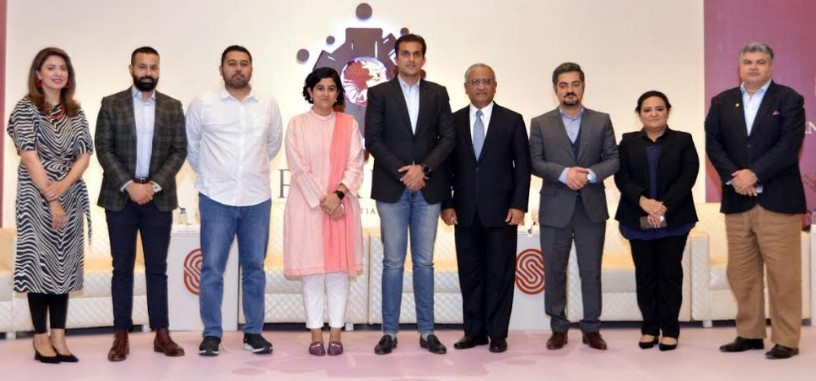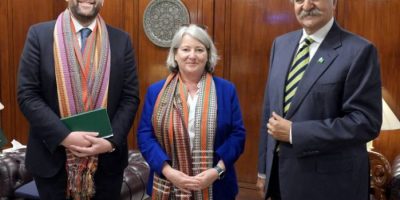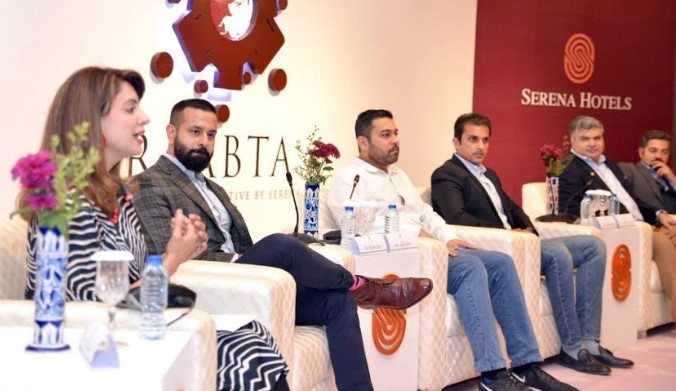Serena hosts high-profile discussion on Pakistan’s digital economy

ISLAMABAD, FEB 28 (DNA) – A high-profile panel discussion on Pakistan’s digital future attended by prominent players in the local digital industry was hosted on Thursday evening by Serena hotels as part of its Public Diplomacy Initiative called “Raabta”.
The event titled “Reimagine our Digital Future – Preparing to thrive or survive?” was hosted by Raabta curator and prominent journalist Sidra Iqbal. Raabta is a nonpartisan public initiative by Serena hotels to initiate dialogue aimed at creating awareness amongst diverse groups and networks on critical aspects of socially significant fields such as the economy, health and education.
A lively and thought-provoking discussion was held about the challenges facing the local digital economy in face of its rapid expansion, and the challenges and opportunities this brings in terms of innovation, governance, job market, cyber risks, regulation and ease of doing business.
“The focus of today’s event is to discuss the potential benefits and costs arising from global digital technology changes and, importantly, anticipate public policy solutions to emerging problems that will shape the future of society and the economy for generations to come,” said Sidra Iqbal. “Change can come within a generation if managed properly, rather than waiting for millennia. We are asking if the policymakers going to be reactive to the digital revolution or take the bull by the horn and prepare an environment for the digital economy to thrive?”
The keynote speaker at the event was Chief of Prime Minister Imran Khan’s “Digital Pakistan” initiative Tania Aidrus, who spoke about the 5 pillars that form the cornerstone of the Government’s digital policy which include access and connectivity, digital infrastructure, eGovernment and digital skilling. Tania said the response to the PM’s digital initiative was overwhelmingly good and it felt like a movement already.
Tania said a lot was happening in the digital arena but it’s important to keep an end view in sight and take a strategic approach. She said the efforts at provincial and federal level have to be synchronized to achieve the objectives on a broader scale. She said the internet is a democratizing force and digital allows equitable access to knowledge provided the affordability of digital infrastructure was enabled and commodities like the internet are not taxed as a luxury item. She made comparisons between 35% internet penetration in Pakistan to developing countries like Myanmar where it stands at 80% hence policymakers need to start making smartphones and internet access especially in rural areas more affordable and accessible. She further said the AI and the internet of things is improving decision making in multiple areas like affordable healthcare, distance learning and transportation.
The panel included prominent figures of the local digital landscape including GM of Careem Zeeshan Hasib Baig, MD Daraz.pk Ehsan Saya, CEO Foodpanda Nauman Sikandar Mirza, Chief Corporate and Enterprise Officer Jazz Ali Naseer, MD KPITB Dr. Shahbaz Khan and Chief Business Support Officer U Microfinance Bank Sharmeen Niaz.
GM of Careem Pakistan, Zeeshan Hasib Baig said that Careem had enabled 500,000 jobs which shows that going digital will not take away jobs as some fear, however it will change the way we work and make it more efficient so the focus can be on better quality leading to productivity gains. He said digital companies like Careem are improving livelihoods, moreover they are allowing females much better mobility for work and leisure.
Speaking of challenges facing the digital sector, he said the industry growth rates are encouraging but the will of execution needs to be there including from the bureaucracy and regulatory authorities. He said that decentralization of provinces brings its own challenges for countrywide businesses like Careem, so the Government needs to improve ease of doing business and regulatory policies.
Ali Naseer from Jazz said we need to change the lens of how we look at things and there needs to be a paradigm shift in our traditional processes to allow for digital to be effective lest we become redundant. “Whilst we have 3G/4G broadband license since 2014 but less than 40% of the population is connected on broadband currently which is a travesty. Out of the 76 million people who do use it, more than 96% do so on their cellphones. This number could have been 170 million plus if all registered cellphones were subscribed to the network but due to weaknesses in the licensing regime and internal challenges this has not happened.” He said if cost of handsets were reduced, especially the entry level smartphones then we could see a rapid expansion of mobile broadband networks.
Nauman Sikander Mirza of food delivery service Foodpanda Pakistan said that Pakistan’s digital economy was in very early stages with no e-commerce companies operating in the country and very few government entities using automation. He lamented the dearth of restaurant outlets in the country but said he saw a great opportunity in home chefs who have the ability to become agents of change in the industry.
MD of online selling platform Daraz.pk Ehsan Saya spoke about digitization boosting the trade industry like never before despite the fact that the majority of the population is not accustomed to buying online. He said the e-commerce will pick up eventually when the Government improves regulation but also as companies like Daraz and Foodpanda and Careem are slowly winning the trust of the people through quality assurance and good service that will decrease the reluctance of customers to pay through credit cards.
The digital gurus mentioned the measures they had undertaken for quality assurance and training of skill-sets to match the demands of the growing sector.
CEO Serena Aziz Boolani thanked the esteemed panelists for making themselves available for the event and said, “At Serena we promote and support sports, adventure tourism, culture and dialogue through our various diplomacy initiatives. Raabta is our Public Diplomacy Initiative that uses the convening power of Serena to bring together experts, policy makers and the interested citizenry to inform and engage individuals and organizations in advancing debate and creating knowledge. The idea is to foster inclusive dialogue with the aspiration of building a sustainable future.”=DNA
=========
Related News

Irish envoys meet Syed Naveed Qamar to strengthen ties
ISLAMABAD, JUL 15 /DNA/ – The Ambassador of Ireland to Pakistan, Mary O’Neill, along withRead More

UK introduces eVisas for Pakistani and skilled workers
Most main applicants travelling to the UK on study or work-related visas will no longerRead More



Comments are Closed